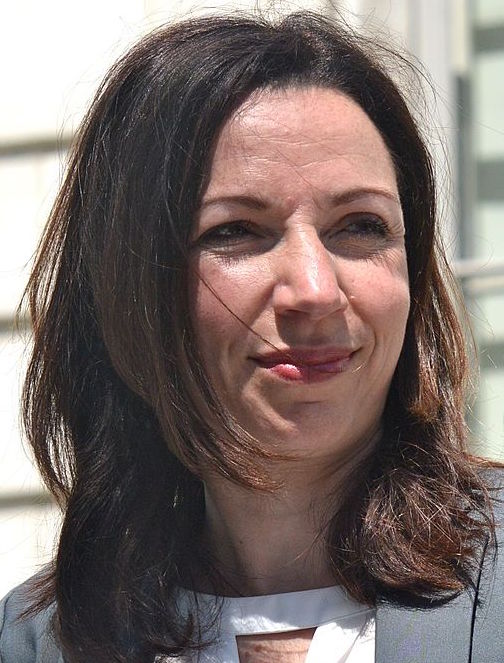On Sunday, when a respected Quebec politician declared for the leadership of the Bloc Québécois, it should have been welcome news for Quebec sovereignists. Instead it provoked controversy.
A one-time Hydro-Québec engineer, former Minister of Natural Resources in the government of Pauline Marois, and two-time candidate for the Parti Québécois leadership, Martine Ouellet is a PQ member of the Quebec National Assembly.
If elected Bloc leader, as appears likely, Ouellet will leave the PQ caucus, but continue to perform her duties as an independent MNA (Member of the National Assembly). She intends to stay in office until the 2108 Quebec election, and then contest the federal election expected in 2019.
Longtime Bloc leader Gilles Duceppe reacted negatively to the news of the division of labour proposed by Ouellet. The two responsibilities are “incompatible,” he told Marie Vastel of Le Devoir, when asked to comment on the Ouellet candidacy.
It is hard work being a party leader in Ottawa and representing citizens as a Quebec legislator is a full-time demanding occupation as well; but, as Ouellet pointed out, that there is a precedent for the dual role. In 1983 Marcel Léger, a Quebec MNA, founded the Nationalist Party, which subsequently won 2.5 per cent of the Quebec vote in the 1984 federal election (though he had stepped down as leader before the vote).
PQ leader Jean François Lisée has declared that Quebec independence is on the agenda … for the year 2022. Ouellet is happy to work with that timetable. A strong sovereignist, Martine Ouellet sees an opportunity in Ottawa to promote Quebec independence. She plans to play a leading role in fights against Energy East and other infringements on the powers of Quebec to control its own destiny.
The Bloc leadership will be decided in a telephone and Internet vote taking place over three days in April, with the winner being announced April 22.
Though the Bloc now hold 10 seats in Ottawa and play a spoiler role in federal elections, the leadership contest is unlikely to attract wide attention, despite the presence of Ouellet.
Trumpism looms in Conservative race
Now well under way (though nominations only close February 24) the Conservative leadership features 14 registered candidates, multiple debates and will conclude with voting day May 27. The race is notable for the emergence of two wannabe Trump candidates promoted constantly by the Canadian wannabe American media.
Kellie Leitch created a media storm with her insistence that potential immigrants be quizzed by immigration officials on their adherence to “Canadian” values. Her messages were understood not just as a stated rejection of multiculturalism, but as resistance to “barbaric cultural practices,” Conservative code for Muslim religious observance.
The narcissist Kevin O’Leary owes his name recognition factor to his 10-year career on Canadian television. Notably he was fingered by the CBC to co-host The Lang and O’Leary Exchange, a daily business propaganda program billed as “news.”
With no political experience and a domicile in Boston, in a normal world O’Leary would be a fringe candidate. Instead that role has been given to Member for Wellington Halton-Hills Michael Chong.
The intelligent, articulate, bilingual Chong is the inheritor of Progressive Conservatism, the forerunner to the Canadian Conservative Party fashioned by Stephen Harper out of the Western populist Reform Party launched by Preston Manning.
Given his outlook and inability to generate support, National Post’s David Akin quipped that Chong should be running for the NDP leadership. If he did, at least there would be someone in the race.
NDP leadership awaits candidates
Despite advance hype surrounding at least six candidates to succeed Tom Mulcair, none has seen fit to declare for the leadership, unsurprisingly perhaps, given that the race will only be decided in October.
Manitoba MP Niki Ashton who ran last time, along with federal MPs Peter Julian of B.C., Charlie Angus of northern Ontario, and Guy Caron of Quebec look ready to contest the race. Highly touted Ontario MPP Jagmeet Singh is considered a strong potential candidate, should his soundings of party members convince him to take up the challenge.
Waiting to be drafted should no consensus winner emerge is big personality Nathan Cullen of northern B.C, who ran well in the race to succeed Jack Layton.
In Canadian politics a winning candidate is currently defined as one that can take on Justin Trudeau and make him look weak.
Trudeau is unafraid to campaign. One year and three months after his decisive victory over Stephen Harper’s Conservatives, Trudeau did a 17-stop question-and-answer Canadian tour to demonstrate his willingness to engage with the public.
Though occasionally harassed, insulted or wrong-footed by questioners, Trudeau the younger comes off as someone people want to meet and talk with, a political figure capable of meeting Canadians on their home ground, abilities that matter at election time.
Runners in three leadership races will have to measure up.
Duncan Cameron is former president of rabble.ca and writes a weekly column on politics and current affairs.
Photo: Asclepias/Wikimedia Commons



